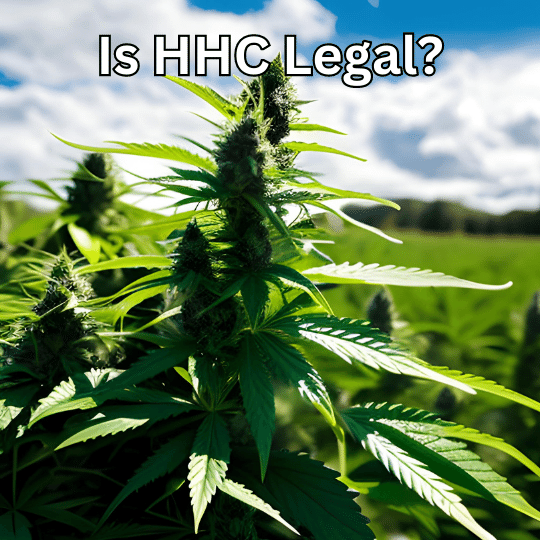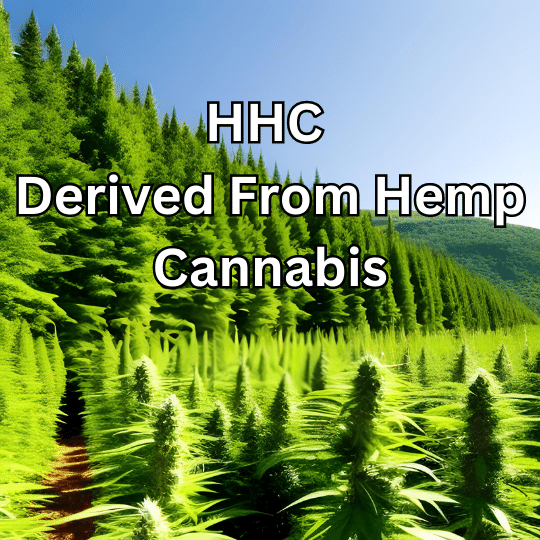
Is HHC Legal? We have answers.
Learn about HHC, its legal status in the US, and how it compares to other cannabinoids like THC, CBD, and Delta-8 THC.
HHC and Its Rising Popularity
Is HHC legal? This question has been on the minds of many in recent years as the popularity of this cannabinoid continues to rise. To answer it succinctly: the legality of HHC varies depending on the jurisdiction. In this article, we'll delve deeper into the details surrounding HHC, its legal status, and how it compares to other cannabinoids like THC, CBD, and Delta-8 THC.
What is HHC?
Hexahydrocannabinol, or HHC, is a lesser-known cannabinoid found in the cannabis plant. Though not as prevalent as its popular cousins, THC and CBD, HHC is still making a name for itself in the world of cannabis products. HHC is considered a minor cannabinoid and is typically derived from hemp plants. It is important to note that there are different types of HHC, such as HHC-6 and HHC-8, each with unique properties.

Understanding the Production Process of HHC
Creating HHC involves a meticulous extraction and synthesis process. First, manufacturers extract cannabinoids from hemp plants, specifically focusing on the non-psychoactive compound cannabidiol (CBD). Next, the extracted CBD undergoes a chemical conversion process in which it is transformed into HHC by adding hydrogen molecules to its structure. This process, known as hydrogenation, changes the chemical properties of the compound, resulting in the formation of HHC with its distinct characteristics.
It is important to note that the production of HHC should only be carried out by qualified professionals in controlled environments, as the process requires specific knowledge, equipment, and adherence to safety protocols to ensure a high-quality and safe final product.All HHC used by EH Delta has been third party lab tested for efficacy.
Does HHC Get You High? A Closer Look at Its Psychoactive Effects
When it comes to HHC and its psychoactive effects, the experience is typically milder compared to that of THC. While both HHC and THC interact with the body's endocannabinoid system, HHC's altered chemical structure results in a less potent impact on the CB1 receptors found in the brain. Consequently, HHC can produce a subtle psychoactive effect, often described as a more manageable and less intense high compared to THC. Users have reported a sense of relaxation, mental clarity, and mild euphoria without the overwhelming sensations associated with traditional THC products.
However, individual experiences may vary, and it's essential to remember that the effects of HHC can be influenced by factors such as dosage, personal tolerance, and the specific type of HHC being consumed. Read this article to learn more about taking HHC edibles.
Legal Status of HHC in the United States
The legality of HHC varies by state and is often determined by the source from which it is derived. If HHC is extracted from hemp plants containing less than 0.3% THC, it is generally considered legal under the 2018 Farm Bill. However, individual states may have their own laws and regulations regarding the production, sale, and use of HHC products. It is essential for consumers and businesses to familiarize themselves with their local laws to ensure compliance.
Comparison to Other Cannabinoids: THC, CBD, and Delta-8 THC
HHC's legal status can be better understood by comparing it to other cannabinoids. THC, or tetrahydrocannabinol, is the psychoactive compound found in marijuana and is federally illegal in the United States. CBD, or cannabidiol, is a non-psychoactive compound derived from hemp plants and is legal under federal law. Delta-8 THC is another minor cannabinoid with a legal status that varies by state.
HHC's effects are similar to those of THC, but with a reportedly milder psychoactive experience. This has made HHC an attractive option for those seeking the benefits of cannabis without the intense high associated with THC.

Potential Benefits and Risks of HHC
Research on HHC is still in its early stages, but anecdotal evidence suggests that it may offer several benefits, including pain relief, anti-inflammatory effects, HHC for sleep, and potential anxiety reduction. However, more research is needed to confirm these claims and uncover potential risks associated with HHC use.

Future Outlook on HHC Legality
As the cannabis industry continues to evolve and more research on HHC becomes available, it is possible that the legal landscape for HHC will change. Consumers and businesses should keep a close eye on any developments in legislation to stay informed and compliant.
Summary: Navigating the HHC Legal Landscape
To answer the question, "Is HHC legal?" – it's complicated. HHC's legal status depends on the jurisdiction and the source from which it is derived. Though federal law may permit the use of HHC derived from hemp plants containing less than 0.3% THC, individual states may have their own regulations. For the time being most customers in the United States are permitted to purchase HHC products from companies like EH Delta so long as they current regulations remain intact.
As a consumer or business owner, it's crucial to stay informed about the latest developments in HHC legality and potential benefits and risks associated with its use.
Frequently Asked Questions
Q: What is HHC?
A: HHC is a minor cannabinoid found in the cannabis plant, known for its potential therapeutic benefits and milder psychoactive effects compared to THC.
Q: Is HHC legal in all 50 states?
A: The legality of HHC varies by state and depends on the source from which it is derived. It is essential to research your local laws before purchasing or using HHC products.
Q: Can HHC get you high?
A: HHC can produce psychoactive effects, but they are generally milder than those of THC. Some users report a more subtle and manageable experience with HHC compared to THC.
Q: How is HHC different from THC and CBD?
A: HHC is a minor cannabinoid with milder psychoactive effects compared to THC. CBD is a non-psychoactive cannabinoid known for its potential therapeutic benefits.
Q: Is HHC safe to consume?
A: While anecdotal evidence suggests that HHC may offer potential benefits, research is still limited. It is essential to consult with a healthcare professional before using any new cannabinoid product.
Q: Are there potential side effects of HHC use?
A: Since research on HHC is limited, the full range of potential side effects is not yet known. Users should proceed with caution and monitor their reactions when trying HHC for the first time.
HHC Legal Status by State:
- Alabama: Unrestricted (hemp-derived HHC legal)
- Alaska: 0.3% limit (hemp-derived HHC legal within concentration limits)
- Arizona: Unrestricted (hemp-derived HHC legal)
- Arkansas: Unrestricted (hemp-derived HHC legal)
- California: 0.3% Limit (certain HHC gummy products or other edibles legal)
- Colorado: Restricted
- Connecticut: Restricted (Registered Vendors Only)
- Delaware: 0.3% Limit (hemp-derived HHC legal within concentration limits)
- Florida: Unrestricted (hemp-derived HHC legal)
- Georgia: Unrestricted (hemp-derived HHC legal)
- Hawaii: Unrestricted (hemp-derived HHC legal)
- Idaho: 0.3% Limit (hemp-derived HHC legal within concentration limits)
- Illinois: Unrestricted (hemp-derived HHC legal)
- Indiana: Unrestricted (hemp-derived HHC legal)
- Iowa: 0.3% Limit (hemp-derived HHC legal within concentration limits)
- Kansas: Unrestricted (hemp-derived HHC legal)
- Kentucky: 0.3% Limit (hemp-derived HHC legal within concentration limits)
- Louisiana: Unrestricted (hemp-derived HHC legal)
- Maine: Unrestricted (hemp-derived HHC legal)
- Maryland: Unrestricted (hemp-derived HHC legal)
- Massachusetts: Unrestricted (hemp-derived HHC legal)
- Michigan: 0.3% Limit (hemp-derived HHC legal within concentration limits)
- Minnesota: 0.3% Limit (hemp-derived HHC legal within concentration limits)
- Mississippi: Unrestricted (hemp-derived HHC legal)
- Missouri: Unrestricted (hemp-derived HHC legal)
- Montana: Unrestricted (hemp-derived HHC legal)
- Nebraska: Unrestricted (hemp-derived HHC legal)
- Nevada: Unrestricted (hemp-derived HHC legal)
- New Hampshire: Unrestricted (hemp-derived HHC legal)
- New Jersey: Unrestricted (hemp-derived HHC legal)
- New Mexico: Unrestricted (hemp-derived HHC legal)
- New York: 0.3% Limit (hemp-derived HHC legal within concentration limits)
- North Carolina: Unrestricted (hemp-derived HHC legal)
- North Dakota: 0.3% Limit (hemp-derived HHC legal within concentration limits)
- Ohio: Unrestricted (hemp-derived HHC legal)
- Oklahoma: 0.3% Limit (hemp-derived HHC legal within concentration limits)
- Oregon: 0.3% Limit (hemp-derived HHC legal within concentration limits)
- Pennsylvania: Unrestricted (hemp-derived HHC legal)
- Rhode Island: 0.3% Limit (hemp-derived HHC legal within concentration limits)
- South Carolina: Unrestricted (hemp-derived HHC legal)
- South Dakota: Unrestricted (hemp-derived HHC legal)
- Tennessee: Unrestricted (hemp-derived HHC legal)
- Texas: Unrestricted (hemp-derived HHC legal)
- Utah: Restricted
- Vermont: Unrestricted (hemp-derived HHC legal)
- Virginia: Unrestricted (hemp-derived HHC legal)
- Washington: Restricted
- West Virginia: Unrestricted (hemp-derived HHC legal)
- Wisconsin: Unrestricted (hemp-derived HHC legal)
- Wyoming: Unrestricted (hemp-derived HHC legal)
